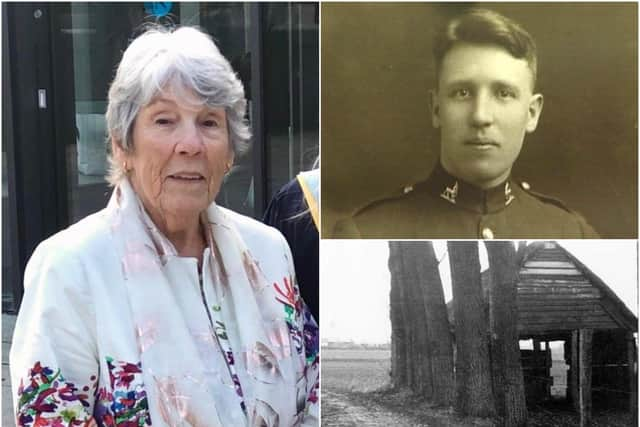Daughter's call for medal for her WW2 hero father from Warwick
and live on Freeview channel 276
Following our story from Unlocking Warwick about the three Warwick soldiers who were victims of the Wormhoudt-Esquelbecq Massacre of British POWs by the SS during the retreat to Dunkirk 80 years ago, more has come to light showing that a fourth Warwick soldier was involved, and he was one of the two heroic officers who gave their lives to save others.
Augustus Jennings was the Company Sergeant Major in charge of the Royal Warwickshire Regiment unit involved, and he performed an extraordinary act of bravery trying to protect his men.
Advertisement
Hide AdAdvertisement
Hide AdIn the Hands of the SS British troops from the Royal Warwickshire Regiment, with some others from the Gloucesters and the Worcesters and some French soldiers, had been grimly holding up the German advance, under orders to ‘resist to the last bullet’, allowing more than 300,000 British troops to escape from the Dunkirk beaches.


When they ran out of ammunition they surrendered and became prisoners of war.
But their captors were the elite Hitler bodyguard unit of the Waffen SS.
They herded the men into a barn, shot some of them and then hurled in grenades. CSM Augustus Jennings and Sgt Stanley Moore threw themselves on to the grenades to protect the men and were killed instantly.
Out of nearly a hundred men, six survived.
Advertisement
Hide AdAdvertisement
Hide AdAugustus Jennings’ great-granddaughter saw the article about the ‘forgotten massacre’ in this newspaper and contacted Unlocking Warwick, the Warwick Town Council volunteers who are researching the stories behind the names on the Warwick War Memorial.
She put them in touch with her ‘nan’ Diane Norton, the daughter of CSM Jennings, now in her 80s and living with her son in Plymouth.
This week she is renewing her attempt to have her father properly recognised with campaign medals sent to the family and possibly an appropriate posthumous award.
Augustus Jennings was a career soldier, joining up when he was just 17 and serving first in Egypt and India, then in 1936 coming back to Warwick to live with his wife Florence in military accommodation at Budbrooke.
His daughter Diane was born in Warwick.
Advertisement
Hide AdAdvertisement
Hide AdShe said: “When my father was despatched to Belgium in 1939, my mother, sister and I moved to my grandparents’ house in Rugby.
"I was too young to remember my father very well, but my mother said that when he had to return to the front after a short leave over the new year, he told his father-in-law, ‘look after the girls; I’m not going to get out of this one’.”
In the chaotic retreat to Dunkirk, he was reported missing, and that was all the family knew for three and a half years, until a letter arrived presuming his death and telling the widow the cost of having his name on a gravestone in France.
According to Diane: “My mother was furious. She was struggling to bring up two daughters alone and had become a teacher cramming three years training into one.
Advertisement
Hide AdAdvertisement
Hide Ad“She had received the service scroll from the King sent to all the troops, and just one medal, the Long Service Good Conduct Medal.
“Little did she know that her husband had died in an act of great heroism.”
The truth about the murder of the POWs emerged in 1988 when newspapers starting carrying accounts from the survivors and the story appeared on ITV’s The Cook Report.
In the programme, one of those who survived, Reg West, said bluntly: “When the grenades came into the barn, Sgt Jennings threw himself on to the first one and was blown to bits”.
Advertisement
Hide AdAdvertisement
Hide AdDiane met four of the survivors and was shocked to find some of them living in poverty.
She was determined that the men should be honoured. Jeff Rooker MP, now Lord Rooker, took up her cause and suggested her father might be considered for a posthumous Victoria Cross.
Diane can remember word for word the reply from the then Prime Minister,Margaret Thatcher: “The medal list was closed in 1946 by King George VI and I see no reason to reopen it.”
Twenty years ago, the site of the massacre was preserved with the help of a public appeal that allowed the field to be bought from the local farmer by the local council in Esquelbecq, and the barn reconstructed as a museum and memorial.
Diane was invited to the opening as guest of honour.
Advertisement
Hide AdAdvertisement
Hide AdNow, with the 80th anniversary of the Dunkirk evacuation that the Warwick’s were protecting Diane has written to the Minister for Veterans, Johnny Mercer MP saying: “I have a son and grandchildren and feel that if there are medals due to my father, they should have them to be kept in the family.”
Secretary of Unlocking Warwick, Rick Thompson said: “We were delighted that Augustus Jennings’ family got in touch after reading about the massacre in the Courier.
“We did not know very much about him; we are very surprised that his extraordinary act of self-sacrifice in the barn at Wormhoudt 80 years ago should have gone unrecognised for so long, and we hope the authorities will ensure the family receives all of CSM Jennings’ campaign medals, and a suitable gallantry medal.
"He is commemorated on the Rugby War Memorial with his name added in 2013.
“Perhaps Augustus Jennings should also be honoured in Warwick. In the meantime he will appear in the ‘Not Forgotten’ section on the War Memorial website www.warwickwarmemorial.org.uk ”.